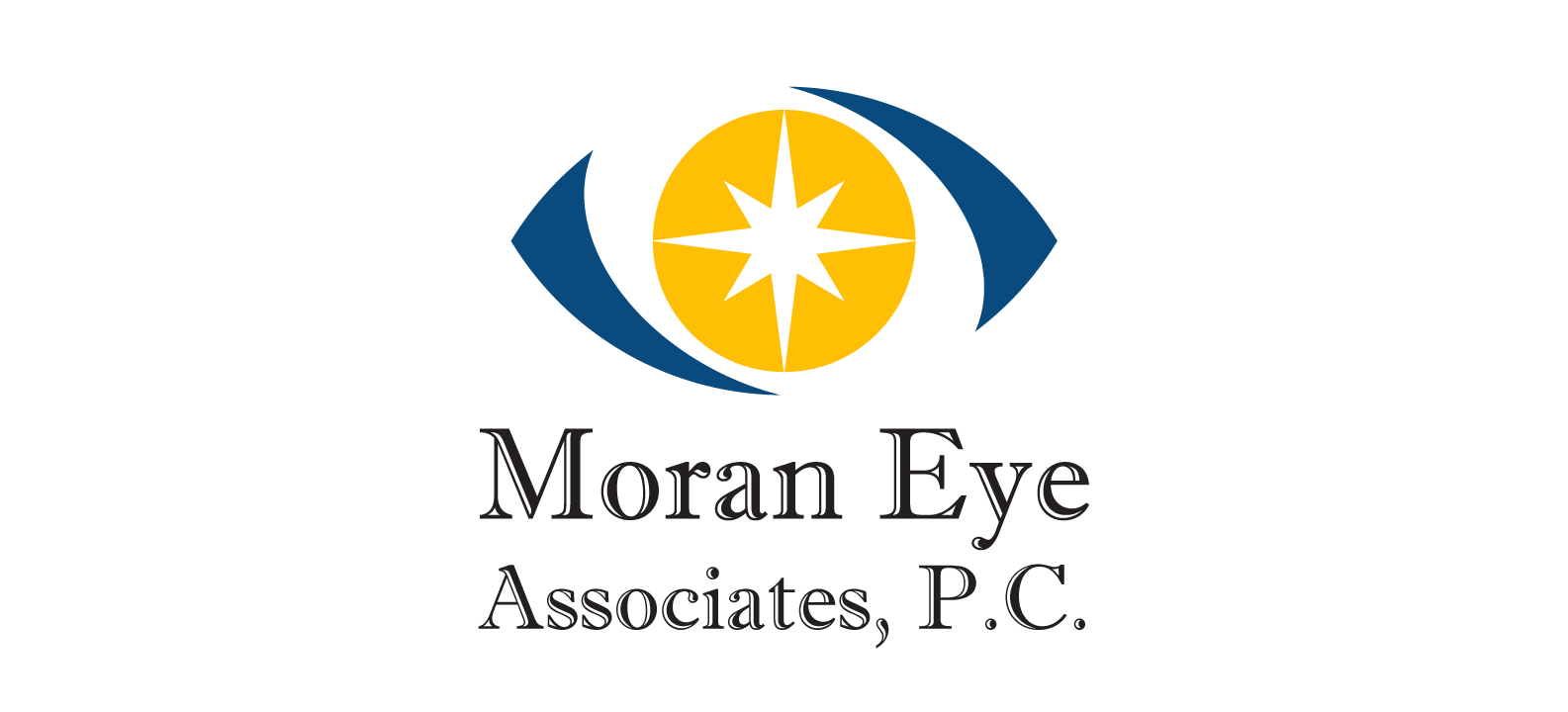by Dr. M | Aug 23, 2019 | Contact Lenses, Exam, Eyeglasses, Glasses, Mark Moran, Office, Patient Care, Prescriptions, Procedure, Vision
What is the first test we do when you come into the office for a complete vision exam?
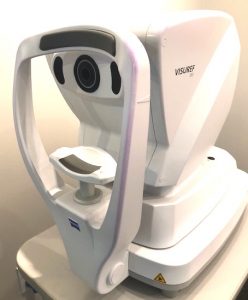
The Autorefractor measures your prescription
We take a measurement of your vision with the AutoRefractor.

Focus on the balloon!
When you take a seat at the autorefractor, we ask you to look into the device. You will see a blurry hot air balloon at the end of a long straight road. As the balloon comes into focus, we measure your prescription.
We ask you to focus on the image (balloon) to keep your eye centered while we take measurements. It only takes just a few seconds to measure using an autorefractor. The balloon is at the center of the image, which aligns your eye perfectly for the test.
When we use this machine, nothing touches your eye, and there is no puff of air!sisipisi.ccsisipisi.ccsisipisi.ccsisipisi.ccsisipisi.cc
The autorefractor provides an objective measurement of a person’s refractive error and prescription for glasses or contact lenses. The device measures how light is changed as it enters your eye.
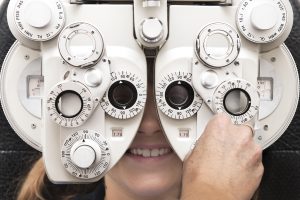
Better 1 or Better 2?
We don’t use the numbers from the device to order your prescription glasses or contacts. The autorefractor is just part of the process. The information from the autorefractor is used as a starting point to determine your best prescription. We take these numbers and dial them into the phoropter.
Here is where your opinion comes in. As we cycle through lenses, we ask, “Is it Better 1 or Better 2?” Your responses help us to pinpoint your best vision. When we show you different choices, we aren’t trying to trick you! We are showing you different options to find your best correction.
Why do we use a balloon photo?
The image isn’t important, but the need to focus on something at a distance is key to a good measurement. The balloon is just one of many visual targets used in the autorefractor. Besides the hot air balloon, other popular images include: a pinwheel/peppermint candy, a house (or barn) at the end of a road, a house in the middle of a field.
FOR MORE INFORMATION CLICK HERE…
by Dr. M | Jul 17, 2019 | Contact Lenses, Donate, Eyeglasses, Glasses, Sunglasses, Vision
If you care enough to recycle, we can help!
Bring your recyclable vision items into our office, and we’ll take care of the rest!
EYEGLASSES:
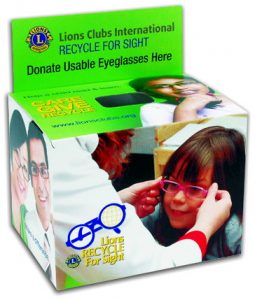
We have a donation box in our office!
Bring your used glasses to the office. We have a collection box for the Lions Club “Recycle Your Sight” program. The donated glasses are measured and then distributed to people who match the prescription. Your donation can help a child to be successful in school, allow an adult to get a job, or a keep a senior citizen living independently.
We accept any type of glasses: distance, reading and sunglasses too! Safety glasses are also welcome. If you have a glasses case, we can accept those too. But don’t worry if you no longer have the case, we will wrap them so they arrive at their destination safelysisipisi.ccsisipisi.ccsisipisi.ccsisipisi.cc.
CONTACT LENS PACKAGING:
While you may be aware that the contact lens boxes can be recycled through your municipal recycling program, did you know that the blister packs can be recycled too?
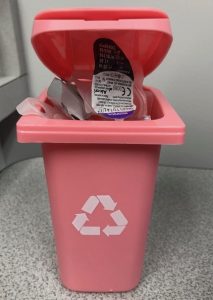
Recycle your contact lens packaging!
Our office takes part in a recycling program that accepts specialty packaging…including the foil and plastic of blister packs. If you wear daily contacts, you are throwing out two containers each day. Multiply that times 30 days/month, 365 days/year…it adds up! Especially when you consider how many patients wear contacts,
Don’t put them in the trash! Collect your discarded containers and bring them into the office. We will send them to our recycling program, and eliminate all of that waste. Recycling small things can make a big difference.
PLUS…for every qualifying shipment a donation will be made to Optometry Giving Sight. This nonprofit organization works to prevent blindness and impaired vision for those who do not have access to eye exams and glasses/contacts. For more info, visit: http://www.givingsight.org
Partner with Moran Eye Associates in recycling.
Working together, we can make a difference!
by Dr. M | Jan 31, 2019 | Cataracts, Cornea, Cost, Diabetes, Education, Exam, Eyeglasses, Medical Eye Care, Procedure, Surgery
When it is time for cataract surgery, you have choices to make that will determine your future vision.
During cataract surgery, Dr. Moran will remove the cloudy lens of your eye and replace it with a clear Intraocular Lens (IOL). Patients have the option to choose from different types of IOLs for their surgery.
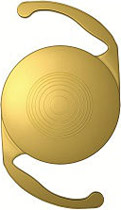
Intraocular lens implant
While all the IOLs offer improved vision, there are some lens choices that offer additional features, such as astigmatism correction, and vision at fixed points of focus – near, intermediate and far vision. Dr. Moran will discuss these lens choices with you. He will explain which option(s) are right for you, taking into consideration the health of your eye and your visual needs after surgery.
The chart below compares the features of the IOLs.
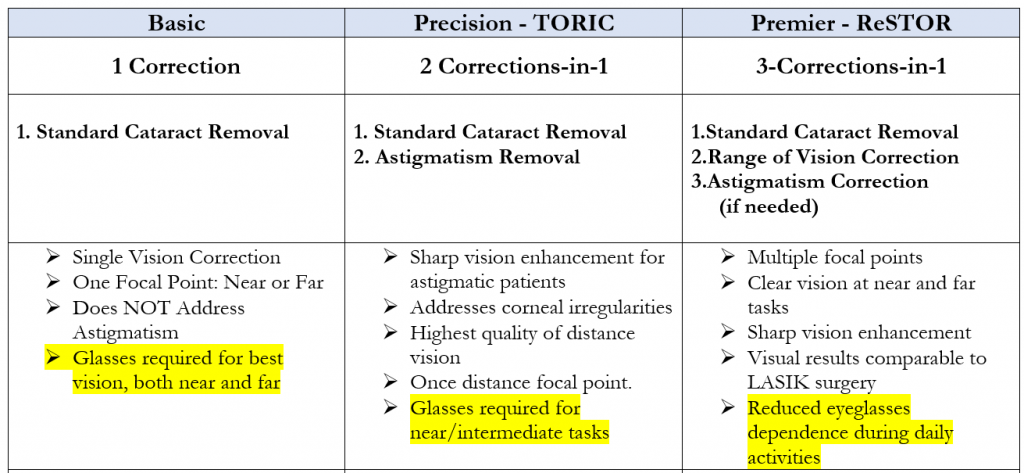
The Basic lens offers 1 area of correction, and may be covered by your insurance. This lens offers clearer vision at one point of focus either distance or near. For patients who don’t mind wearing glasses, this lens is a good option.
The Toric and ReSTOR lenses do more, so there is additional cost for these lenses. Insurance does not cover the cost of these lenses, since they are considered advanced technology lenses. These lenses are special order for you, so payment for these lenses is due one week prior to the surgery date.
The Toric lens corrects one point of focus, either distance or near, and corrects for astigmatism, which is an irregular shape of the cornea. Patients with a corneal astigmatism greater than 1.25 diopters are good candidates for this lens.
The ReSTOR lens offers multiple points of focus. This lens is designed with concentric circles, each with a specific prescription power. Your eye will be able to focus using the right power ring in the lens. ReSTOR lenses are recommended for patients who have healthy eyes, and who are having surgery on both eyes done within a few weeks of each other.
More information about cataract surgery and your IOL choices will be discussed at your cataract evaluation appointment with Dr. Moran, and again with our surgery coordinator at your scheduling/measurement appointment. We encourage all patients to check with their insurance company before their cataract surgery to find out specifics about what is covered under their plan. Some plans have co-pays and deductibles that may affect the amount that the patient will have to pay.
Click to read more about Cataracts
by Dr. M | Dec 27, 2018 | Cataracts, Contact Lenses, Diabetes, Dry Eye, Eye Safety, Eyeglasses, Floaters, Glasses, Glaucoma, LASIK, Low Vision, Macula, Procedure, Retina, Surgery, Vision
A patient asked the other day, “Do you do regular eye exams?”
Of course we do! At Moran Eye Associates we offer Complete Eye Care, which includes Vision, Medical and Surgical services.

Better 1 or 2?
VISION: We accept VSP & NVA
- Routine Eye Exams
- Contact Lenses: Traditional & Specialty Lenses
MEDICAL: We accept most medical insurancessisipisi.ccsisipisi.ccsisipisi.ccsisipisi.cc
- Diabetic Eye Care: Diabetic Retinopathy
- Glaucoma Care: Medical and Surgical Treatment Options
- Macular Degeneration
- Dry Eye Treatment: Diagnostic Services & Thermal Therapy
- Eye Emergencies
- Infection/Inflammation
- Low Vision Services
SURGICAL: Dr. Moran does surgery at the Surgery Center of Allentown, Sightpath LASIK Center in Bethlehem, as well as some procedures in our Delaware Avenue office.
- Cataracts
- LASIK
- PRK
- Laser Floater Removal
- Glaucoma Eye Surgery
- Foreign Body Removal
- Eye Lid Surgery
Please contact our office if you need an appointment for your eye care. Call or text us at 610-628-2022, or send us an email by filling out the form on the right!
by Dr. M | Dec 5, 2018 | Diabetes, Dilation, Education, Exam, Eyeglasses, Floaters, Glasses, Medical Eye Care, News, Office, Patient Care, Retina, Uncategorized, Vision
How does Diabetes affect your eyes?

Diabetics need to see their eye doctor at least once a year.
Diabetes can cause damage to the blood vessels that supply the retina. These damaged blood vessels may leak, swell or bleed causing problems with your vision. Diabetes can also increase the growth of cataracts, and increase your risk of glaucoma. Changes in your blood sugar can cause blurriness in your vision, and fluctuations to your glasses prescription.
What is the best way to keep my eyes healthy?
Annual eye exams are important, because left untreated, diabetic retinopathy can worsen, and lead to blindness. Patients with uncontrolled blood sugar are at a higher risk for problems, but even patients who control their diabetes can develop issues.
Are there warning signs of diabetic eye disease?
Whether you are diabetic or not, if you notice any changes to your vision, you should see your doctor as soon as possible. If you notice a change in prescription, any cloudiness, blind spots or increased floaters in your vision, you should see your eye doctor.
Will controlling my blood sugar help my vision?
Yes. Swings in your blood sugar readings can cause changes to your vision. High blood sugar can cause swelling in the eye, which can affect your vision. If your blood sugar fluctuates, your vision will fluctuate too, and you may find that your glasses don’t work effectively.
Is there a way to treat diabetic retinopathy?
There are different options for treating diabetic retinopathy. Dr. Moran and Dr. Tang can discuss which options are best for your needs. There laser treatments which target the damaged vessels, as well as medications which can help preserve your vision.
If you are Diabetic, Annual Vision Exams are a MUST!
Diabetics have special needs when it comes to taking care of their eyesight. With a dilated exam, your doctor can detect and begin to treat diabetic eye disease before you notice any vision changes. Your annual exam allows our doctors to check for early onset cataracts and glaucoma.
If you (or someone you care about) has diabetes, make sure to connect with the trusted eye care team at Moran Eye Associates.
Call our office to schedule an appointment 610-628-2022.
by Dr. M | Aug 4, 2018 | Education, Exam, Eye Protection, Eye Safety, Eyeglasses, Glasses, Low Vision, Macula, Office, Sun Damage, Sunglasses
 Cocoons Fit-Over Eyewear
Cocoons Fit-Over Eyewear

Cocoons Fit Over Your Glasses
Moran Eye Associates now offers Cocoons Eyewear, our doctors’ choice for professional-grade fitover sunglasses. Designed specifically to fit over your prescription glasses, these lightweight sunglasses come in a variety of tints, styles and sizes to fit your vision needs. Stop in our office to see for yourself!
The unique design of Cocoons isolates your eyes from the elements, keeping you free from glare, harmful UV rays, and fluctuating light conditions. These lenses and the frames work together to keep your eyes protected.

Eliminates glare for people with normal vision and low vision.
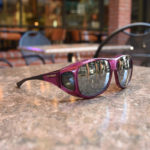
Frames come in multiple colors
These polarized glasses offer UV400 protection, scratch resistant technology, and a one-year warranty. If glare is a problem, polarized lenses provide a significant reduction in glare compared to regular tinted sunglasses. Most sunglasses sold at the store are not polarized unless specifically indicated.
Cocoons are designed to reduce glare and to enhance vision. The specialized color options were developed to target different issues. We recommend that you try on the different lens types to see what works best for you.
- Gray: for natural color definition and general daily use. Reduces light sensitivity while eliminating reflected surface glare.
- Amber: filters scattered blue light to increase contrast and provide improved depth perception in varying lights conditions. Amber is the preferred color for driving.
- Copper: filters scattered blue light and minimizes color distortion to deliver enhanced contrast and color definition
- Yellow: ideal for low light conditions. Maximizes contrast for improved definition and depth perception while eliminating glare. Best in dusk and dawn light, but not the best option for general daily use.
- Blue Mirror: maximizes glare elimination and filters additional blue light for improved contrast while delivering true color definition.
Recommended for Nighttime Driving – Twilight Lenses
Nighttime driving has unique vision issues, due to glare from headlights and reduced available light. Cocoons have developed a special Twilight lens that we recommend. These specialty Twilight lenses help to solve night driving issues because of their anti-reflective coating.
Dr. Moran explains the benefits of the Twilight lenses, “The key to better nighttime vision is anti-reflective coating. Although yellow and amber lenses help with contrast and clarity, they reduce the available light, which can make it hard to see well when you are driving. You have to balance the benefit of increased contrast with the reduction in brightness. Polarized lenses work well in the natural daylight, but don’t help with artificial lights from headlights and streetlights at night. Additionally, polarized lenses cut out 50% of light, which is counterproductive in the dark.”
The Twilight lens system blocks 100% of harmful UV light and 60% or more of harmful High Energy Visible (HEV) blue light while providing 93% overall visible light transmission. The unique filtering properties of these HEV filters effectively reduce scattered blue light and improve contrast without compromising overall light transmission. The lens system is protected by a one-year scratch resistance warranty and includes an anti-reflective coating to minimize glare and halos created by artificial light sources.
Help for patients who have heightened photophobia (light sensitivity).
Low-vision patients may benefit from a different colored tints to give them the best acuity. Sometimes, the tint correlates with specific medical conditions, but most of the time, it is a matter of personal preference. All of these lenses reduce glare and heighten contrast, which is important for low-vision patients. Additional color options include.
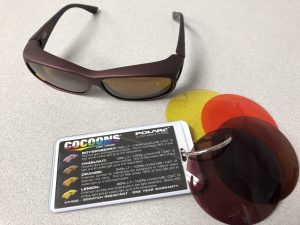
Cocoons Offer Color Options for Best Vision
- Boysenberry (pink): reduces glare and heightens contrast. Blocks 90% of blue light.
- Hazelnut (brown:) reduces glare and heightens contrast. Blocks 98% of blue light.
- Orange: enhances contrast by intensifying the background to improve object definition and clarity. Blocks 100% of blue light.
- Lemon (yellow): enhances contrast and visual acuity in low light conditions. Blocks 40% of blue light.
Whatever your vision needs, we can help you to see your best. We offer the latest technology to help keep your eyes healthy and to protect your vision for years to come.
Call or text us at 610-628-2022 for more information on enhancing your vision. If you’d like to schedule a visit, just click to request an appointment.


